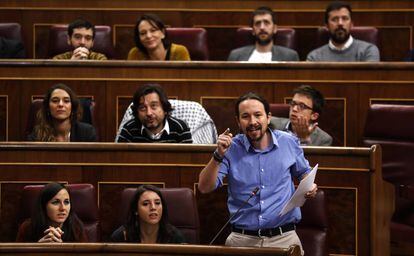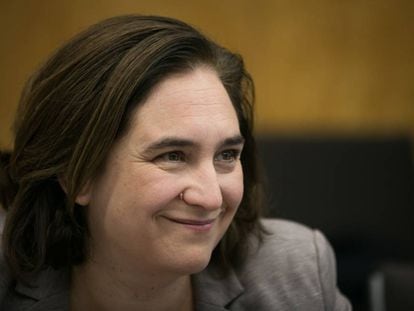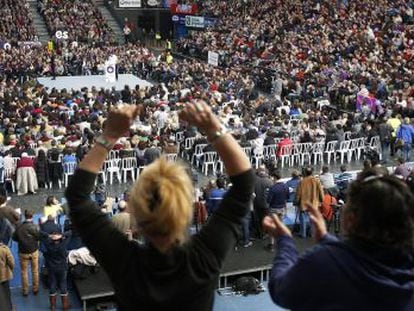Where is the leader of Spain’s far-left Podemos party?
Pablo Iglesias has not been seen in public since the day before the Catalan election


Pablo Iglesias, the leader of Spain’s anti-austerity Podemos party, is nowhere to be seen. His last public appearance was on December 20, when he showed up at an event in Valencia to support victims of the Francisco Franco regime.
Ever since then, the secretary general’s public communications have been confined to the social media and to hosting his television program, Fort Apache.
Iglesias is the only one of Spain’s main party leaders who has not made a public appearance to discuss the outcome of the Catalan elections of December 21, when Podemos ran in coalition with Catalunya en Comú and lost three seats and 40,000 votes compared with the September 2015 elections.
Podemos’ position on the Catalan conflict “was the most sensible one in a polarized context”
Noelia Vera, co-spokeswoman
“When the heads of other parliamentary groups were away on vacation, Iglesias was in Congress to present climate change legislation [on December 15],” said Podemos organization secretary Pablo Echenique on Wednesday, in a bid to downplay Iglesias’ prolonged absence. “Podemos is a collective project, and sometimes it is Iglesias who makes a public appearance, and others it is I or [party co-spokeswoman] Noelia Vera. There is no mystery to it.”
Podemos’ congressional speaker, Irene Montero, has also come out in Iglesias’ defense, saying that he “has not failed to show up at any time,” despite the three weeks’ absence. She added that Podemos’ representatives are “an ensemble cast” and “a pool of spokespeople,” and may thus fill in for one another.
But Iglesias’ absence is all the more noteworthy in light of the fact that the heads of other leading parties – Prime Minister Mariano Rajoy of the Popular Party (PP), Pedro Sánchez of the Socialist Party (PSOE) and Albert Rivera of Ciudadanos – all made public appearances the day after the Catalan elections, and did so again at later dates.
Iglesias is not scheduled to appear in public until Saturday, when he will present a report summarizing the party’s milestones in 2017 and the challenges up ahead. Podemos is facing the most challenging moment of its four-year existence, with surveys showing eroding voter support.
“The clash of identities and the territorial question do not create a favorable framework for our own approach to issues,” admitted Rafael Mayoral, the secretary for civil society and popular movement affairs at Podemos.
The “media barrier”
“The outcome in Catalonia was not what we would have liked,” said Echenique. “We always go out there to win. We’ve lost three seats and a certain percentage of votes, but it’s not a great variation.”
Podemos, which was unaligned with either the separatist or pro-unity parties in Catalonia, obtained 320,000 votes on December 21, representing 7.45% of the total.

Despite the poor performance, co-spokeswoman Noelia Vera said that Podemos’ position on the Catalan conflict “was the most sensible one in a polarized context.”
“We feel that in the midterm, a position like ours is the only way out. It does not seem sensible to change,” she added. Vera also rejected the notion that the party’s strategy in Catalonia may negatively affect subsequent local and regional elections elsewhere in Spain.
Echenique blamed the media for part of Podemos’ communication problems. “It is enormously difficult, in a polarized context like the Catalan issue, to get one’s messages across to citizens. This job is not entirely up to us, it also depends on journalists, on the subjects that are of legitimate interest to the media and to the other political actors.”
“We have been unable to overcome this communication barrier,” added Echenique.
English version by Susana Urra.












































